TGF beta 1 Rabbit Polyclonal Antibody

cat.: ER31210
| Product Type: | Rabbit polyclonal IgG, primary antibodies |
|---|---|
| Species reactivity: | Human, Mouse, Rat, Zebrafish |
| Applications: | WB, IF-Cell, IHC-P, FC |
| Clonality: | Polyclonal |
| Form: | Liquid |
| Storage condition: | Store at +4℃ after thawing. Aliquot store at -20℃ or -80℃. Avoid repeated freeze / thaw cycles. |
| Storage buffer: | 1*PBS (pH7.4), 0.2% BSA, 40% Glycerol. Preservative: 0.05% Sodium Azide. |
| Concentration: | 1ug/ul |
| Purification: | Immunogen affinity purified. |
| Molecular weight: | Predicted band size: 44 kDa |
| Isotype: | IgG |
| Immunogen: | Synthetic peptide (KLH-coupled) corresponding to Human TGF-Beta 1 C-terminal. |
| Positive control: | Raji cell lysate, MCF-7 cell lysate, A549 cell lysate, human kidney tissue lysate, Hela, HepG2, SK-Br-3, human kidney tissue, mouse kidney tissue. |
| Subcellular location: | Secreted |
| Recommended Dilutions:
WB IF-Cell IHC-P FC |
1:500-1:2,000 1:50-1:200 1:50-1:200 1:50-1:100 |
| Uniprot #: | SwissProt: P01137 Human | P04202 Mouse | P17246 Rat |
| Alternative names: | Cartilage-inducing factor CED Differentiation inhibiting factor DPD1 LAP Latency-associated peptide Prepro transforming growth factor beta 1 TGF beta 1 TGF beta TGF beta 1 protein TGF-beta 1 protein TGF-beta-1 TGF-beta-5 TGF-beta1 TGFB Tgfb-1 tgfb1 TGFB1_HUMAN TGFbeta TGFbeta1 Transforming Growth Factor b1 Transforming Growth Factor beta 1 Transforming growth factor beta 1a transforming growth factor beta-1 transforming growth factor, beta 1 Transforming Growth Factor-ß1 |
Images
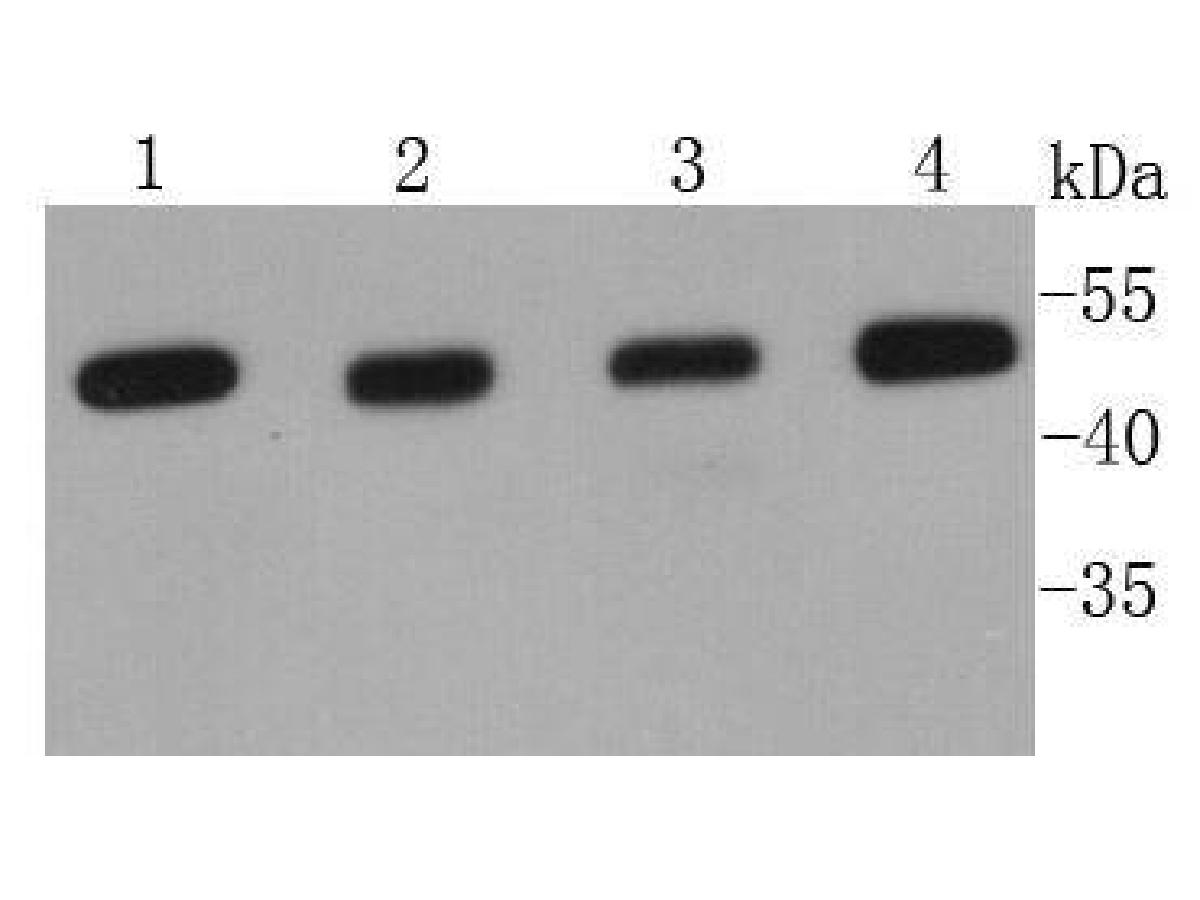
|
Fig1:
Western blot analysis of TGF beta 1 on different lysates. Proteins were transferred to a PVDF membrane and blocked with 5% BSA in PBS for 1 hour at room temperature. The primary antibody (ER31210, 1/500) was used in 5% BSA at room temperature for 2 hours. Goat Anti-Rabbit IgG - HRP Secondary Antibody (HA1001) at 1:200,000 dilution was used for 1 hour at room temperature. Positive control: Lane 1: Raji cell lysate Lane 2: MCF-7 cell lysate Lane 3: A549 cell lysate Lane 4: Human kidney tissue lysate |
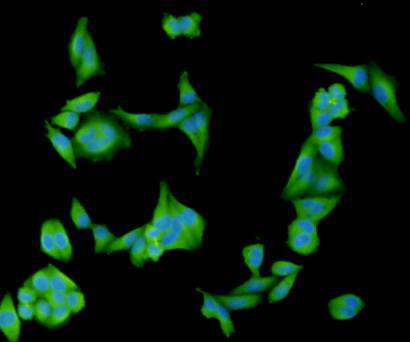
|
Fig2: ICC staining of TGF beta 1 in Hela cells (green). Formalin fixed cells were permeabilized with 0.1% Triton X-100 in TBS for 10 minutes at room temperature and blocked with 10% negative goat serum for 15 minutes at room temperature. Cells were probed with the primary antibody (ER31210, 1/50) for 1 hour at room temperature, washed with PBS. Alexa Fluor®488 conjugate-Goat anti-Rabbit IgG was used as the secondary antibody at 1/1,000 dilution. The nuclear counter stain is DAPI (blue). |
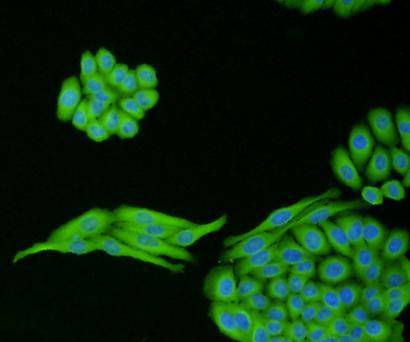
|
Fig3: ICC staining of TGF beta 1 in HepG2 cells (green). Formalin fixed cells were permeabilized with 0.1% Triton X-100 in TBS for 10 minutes at room temperature and blocked with 10% negative goat serum for 15 minutes at room temperature. Cells were probed with the primary antibody (ER31210, 1/50) for 1 hour at room temperature, washed with PBS. Alexa Fluor®488 conjugate-Goat anti-Rabbit IgG was used as the secondary antibody at 1/1,000 dilution. The nuclear counter stain is DAPI (blue). |
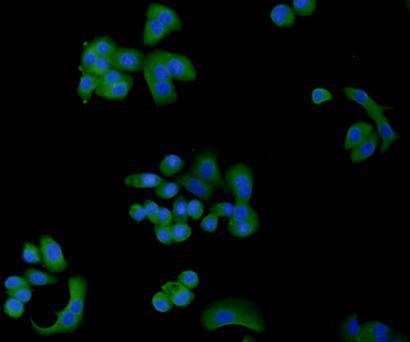
|
Fig4: ICC staining of TGF beta 1 in SK-Br-3 cells (green). Formalin fixed cells were permeabilized with 0.1% Triton X-100 in TBS for 10 minutes at room temperature and blocked with 10% negative goat serum for 15 minutes at room temperature. Cells were probed with the primary antibody (ER31210, 1/50) for 1 hour at room temperature, washed with PBS. Alexa Fluor®488 conjugate-Goat anti-Rabbit IgG was used as the secondary antibody at 1/1,000 dilution. The nuclear counter stain is DAPI (blue). |
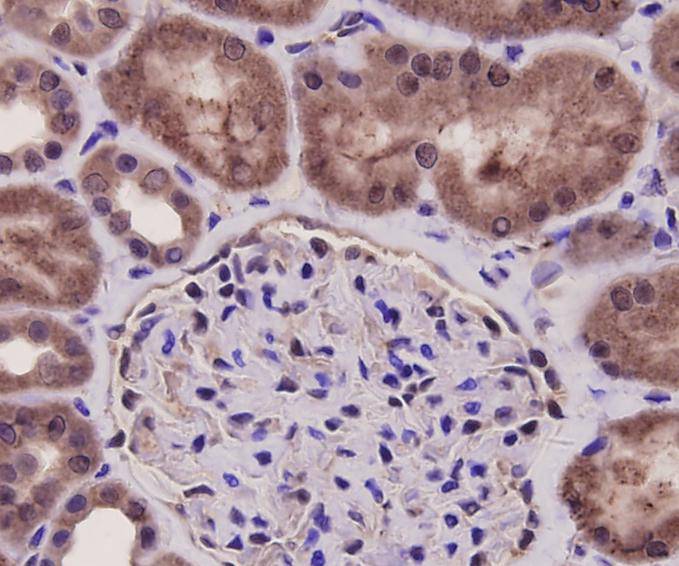
|
Fig5: Immunohistochemical analysis of paraffin-embedded human kidney tissue using anti-TGF beta 1 antibody. The section was pre-treated using heat mediated antigen retrieval with Tris-EDTA buffer (pH 9.0) for 20 minutes.The tissues were blocked in 1% BSA for 30 minutes at room temperature, washed with ddH2O and PBS, and then probed with the primary antibody (ER31210, 1/50) for 30 minutes at room temperature. The detection was performed using an HRP conjugated compact polymer system. DAB was used as the chromogen. Tissues were counterstained with hematoxylin and mounted with DPX. |
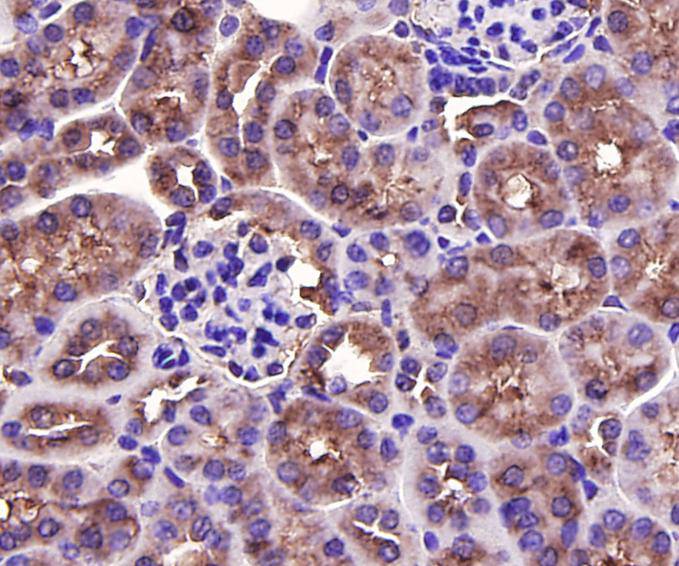
|
Fig6: Immunohistochemical analysis of paraffin-embedded mouse kidney tissue using anti-TGF beta 1 antibody. The section was pre-treated using heat mediated antigen retrieval with Tris-EDTA buffer (pH 9.0) for 20 minutes.The tissues were blocked in 1% BSA for 30 minutes at room temperature, washed with ddH2O and PBS, and then probed with the primary antibody (ER31210, 1/50) for 30 minutes at room temperature. The detection was performed using an HRP conjugated compact polymer system. DAB was used as the chromogen. Tissues were counterstained with hematoxylin and mounted with DPX. |
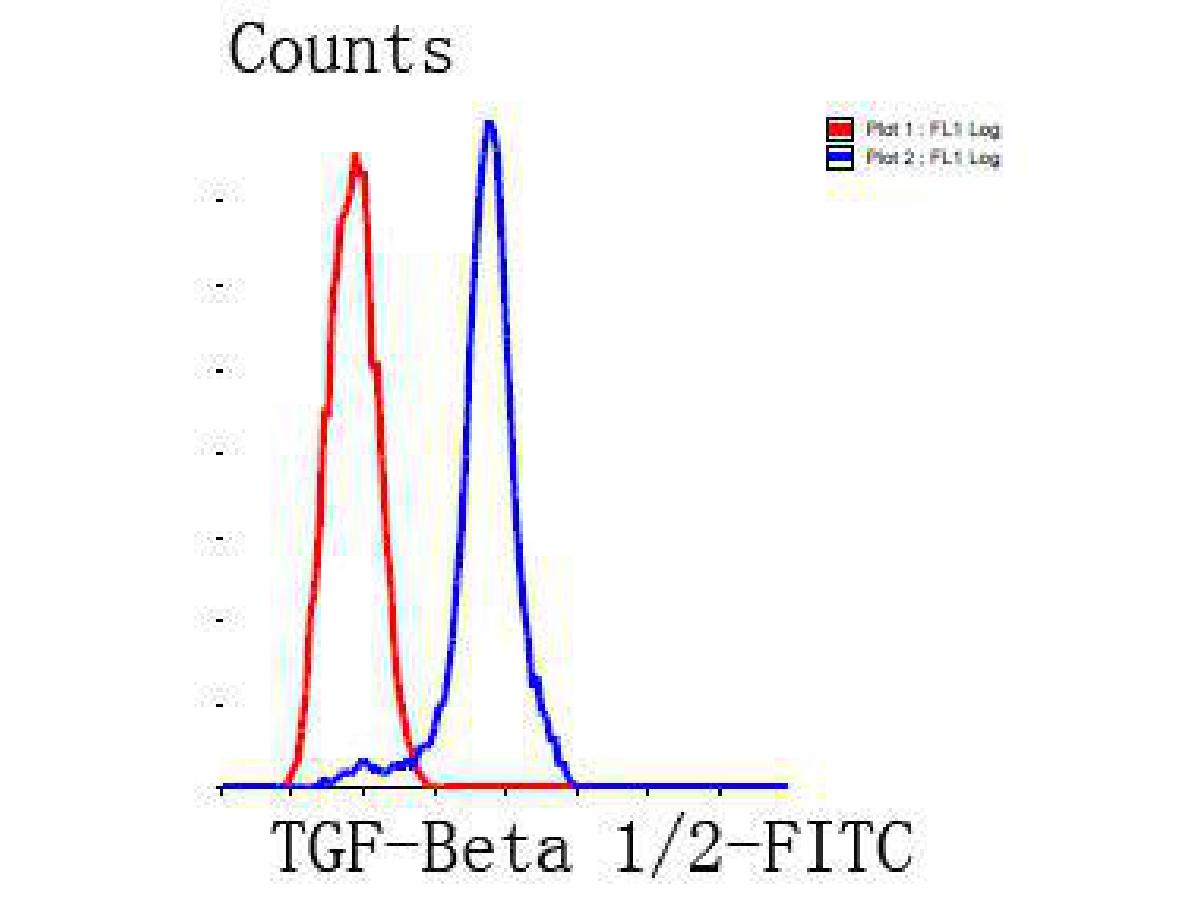
|
Fig7: Flow cytometric analysis of TGF beta 1 was done on HepG2 cells. The cells were fixed, permeabilized and stained with the primary antibody (ER31210, 1/50) (blue). After incubation of the primary antibody at room temperature for an hour, the cells were stained with a Alexa Fluor®488 conjugate-Goat anti-Rabbit IgG Secondary antibody at 1/1000 dilution for 30 minutes.Unlabelled sample was used as a control (cells without incubation with primary antibody; red). |
Note: All products are “FOR RESEARCH USE ONLY AND ARE NOT INTENDED FOR DIAGNOSTIC OR THERAPEUTIC USE”.